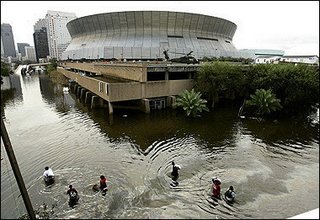Friday, September 22, 2006
The Most Important Game in the History of Monday Night Football

For almost 4 decades, Monday Night Football has been a staple of American television. With an average viewership of 9 million households every week, MNF is a slice of modern
There is no doubt that this is a great opportunity for America to stand up and show its resilience and will to rebuild in the face of tragedy (remember that in the weeks following Katrina, there were many calling for the structure to be demolished). This is also an opportunity to show that the city of
This weeks broadcast of Monday Night Football is an important showcase for the city of
The NFL and ESPN are using this game to show that
We all remember the dreadful sights, and the stories that came from within the Superdome a year ago. We recall seeing the roof of the structure ripped open, the washrooms overflowing with human excrement. All of that can be repaired, cleaned up, painted over and washed away (at the price tag of 187 million, no less). But what about the people? We should not wash our collective memory clean of the people who bore the brunt of this tragedy. The memory should still be fresh in our mind of the 2 elderly people who died inside the Superdome because there were no designated medical staff and no established sick bay to accommodate the vulnerable. We remember the man who jumped from the balcony because the squalid conditions in the Superdome triggered post traumatic memories of the war. We recall the tens of thousands who sought refuge in the Superdome as a shelter of last resort, but were helpless to find that there was no water purification equipment on site, no chemical toilets, no anti-biotics, no anti-diarrhoeals, no electricity. The people who carried on for 4 days without food water or basic amenities should not be forgotten, because these are the people who are struggling to get their lives back together today.
One of the most memorable moments of MNF was when the tragic murder of John Lennon was announced live on the air-this had nothing to do with football, but rather with the climate of current events. The broadcast of this game between the Falcons and the Saints has nothing to do with two undefeated teams but rather with the soul of an entire city that was abandoned and deeply scarred a year ago. As a society, we should not be fooled; the healing process is moving along very slowly.
The NFL has a wonderful ‘socialist’ revenue-sharing system that has enabled the Saints to rebuild their home. Who or what is enabling the tens of thousands of Katrina evacuees to rebuild their homes, and their schools, and their hospitals, and their churches, and their businesses? A year on, there is no portable water, no electricity no plan to rebuild parts of the 9th ward and St. Bernard Parrish. Public town housing areas such as the Lafeyette housing project that weren’t even affected by Katrina has seen its residents locked out and boarded up by the city, because it is prime real estate for the ‘new’
The people of Houston, who generously opened their hearts and homes to the New Orleans evacuees, have lost their patience and are calling for the New Orleans evacuees to leave their city and return home, I only assume that an unbalanced, superficial portrait of a rebuilt, refurbished Superdome as a symbol for the city will mislead Houstonians to thinking that the entire city of New Orleans is rebuilt as well.
Ostensibly, the NFL announced that the Saints have sold out its entire home schedule for the first time in franchise history. This coming barely a year after the largest natural (and partially man-made) disaster in American history. If you believe that they truly sold out the home season, what does this say about our society and the importance that it places on sports? Make no mistake, its great that the Superdome is rebuilt and that football is back in















